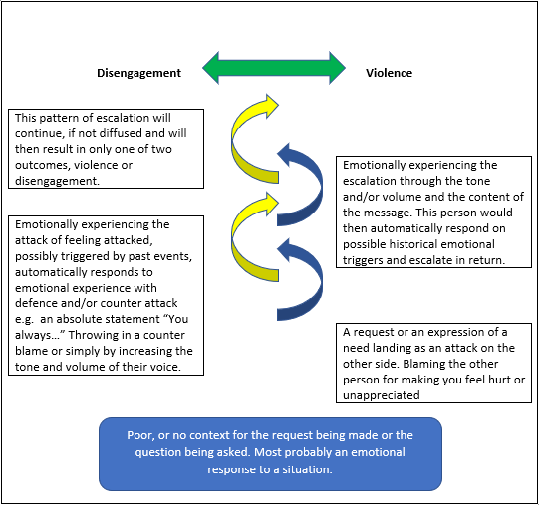How to start fixing your relationship/marriage or toxic work environment
An introduction into managing expectations and dealing with conflict.
It is important to note that any interaction or relationship is communication and we can gauge the quality of a relationship and to large extent a person’s mental health by the quality of their interpersonal interactions. Our communication styles are learnt and influenced by people, events and emotional triggers that we acquire throughout our lives.
The first introduction we have to relationships and therefore communication and how to do it is through our parents which, for some, is a blessing and an inspiration and for other it’s a cycle of fighting and emotional triggers. An example of communication and emotional triggers: Some of us grow up in homes ran by our moms, while others grow up in homes ran by their dads. We then enter relationships with certain expectations based on the experiences we grew up with. Failure to meet those expectation could lead to some troubles. A guy growing up in a house operated by his mom could end up waiting for his wife or partner to take charge and organise things and the woman who grew up in her dad’s home waits for her guy or partner to take initiative. And so, the whole thing falls flat as both parties feel like the other person has dropped them or is not as invested in the relationship. When our expectations aren’t met, we get pissed off. That’s the case with most of us, we get angry and we start a fight, the other person becomes the enemy because they made you feel like crap, but actually it’s your crap, it’s you who didn’t say what you want, or you did, but the other person didn’t hear you.
A story depicting this mismatch or the lack of setting context that I heard and quite like: A couple of newlyweds sit down for dinner which they prepared together. After dinner the man sits down on the couch and watches TV. The lady, in surprise, looks at her husband and asks, what on earth are you doing? He innocently replies that he is watching TV. Now, the stage is set for disaster, but instead the woman walks over to him and sits down next to him and asks him why he feels it unnecessary to help her. He responds that’s the woman’s job. She then asks him where he learnt that? He says that’s the way my parents always did it.
Now the thing about this example is that there was never a conversation about expectation, role definition and need. And when that conversation does come up in the heat of the moment then the question she asked could have landed as an attack and he will most probably would have responded with defence and counter attack. He could have felt the attack or experienced her question as criticism based on his past experiences in which case, he could have said that he deserved a break and that he’d been working all day. In turn, she could say that he always does this and expects her to be his servant. She could also say that she had been working all day and that he only thinks about himself. Now, her need was for him to help her, this probably would’ve made her feel appreciated and respected, but instead the conversation turns into a tit for tat. This pattern looks like the diagram above.
Once we get stuck into the blame and defence cycle there is very little chance for a favourable outcome. Both parties will escalate their attacks, become increasingly personal and either party will either give up and walk away or resort to violence. It is imperative to be able to recognise this pattern of interaction regardless of the nature of the relationship. When it does occur, both parties should have equal right to call for a pause, and state in simple terms that he/she feels attacked and ask the other person to clarify the need or request, coupled with what it will mean to you should this need be met.
· Checking in first with the other party if now is a good time to make a request or clarify something.
· Set Context by saying how you feel and make sure that your request is free from blame (I feel… with no buts!) and add in what it would mean or how you would feel should this request be met.
·Emotional Response Check: If the other person defends, accept that your message or request was unsuccessful and take responsibility that the request or context landed as a blame and attempt to rephrase and clarify.
It sounds simple and elementary, but we never learn these skills or how to go about diffusing a situation once it settled into the back and forth described above.
This is but one example of how easy a destructive pattern of interaction can stem from past emotional experiences. This emotional response coupled with ineffective communication styles and unresolved issues has the potential to lead to toxic work relationships, poor performing work teams, conflict at home and with friends and will inevitable lead to symptoms related to anxiety and depression as one becomes isolated and angry.
The point of psychotherapy and communications training is to identify and heal emotional triggers and to learn to speak with someone rather than at someone. It is my goal, as psychotherapist based in Cape Town, to teach a different way of communicating. As psychologist I am trained to identify these patterns and whether you live in Cape Town or London the patterns will most likely be similar and will most likely repeat. When seeing a psychologist as a couple, for increased corporate team effectivity or as individual seeking to improve or heal, communication will always remain a key aspect that must be explored whether in a workshop or psychotherapy.| |
| |
From Healing to Happiness: A Clinical Psychologist’s Guide to Overcoming Depression and Anxiety










